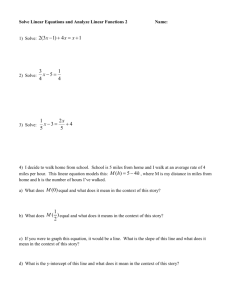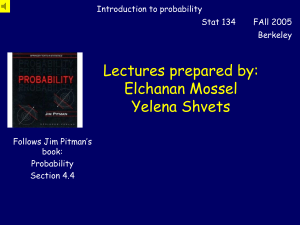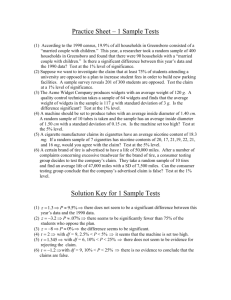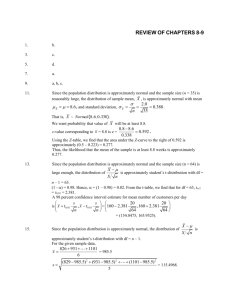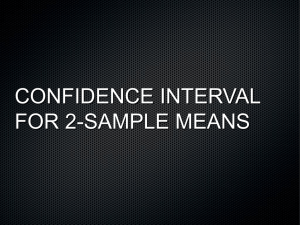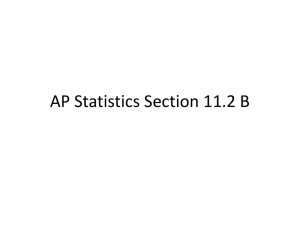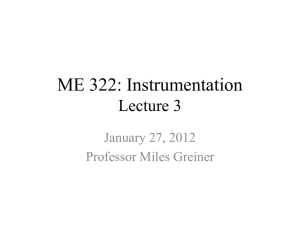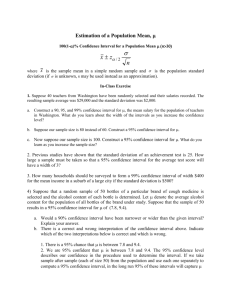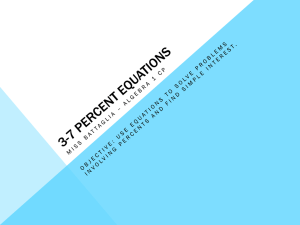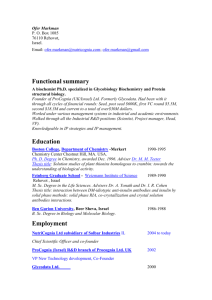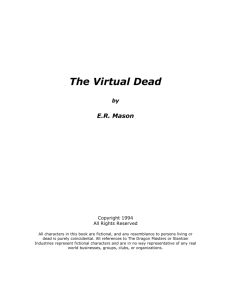Math 243
advertisement
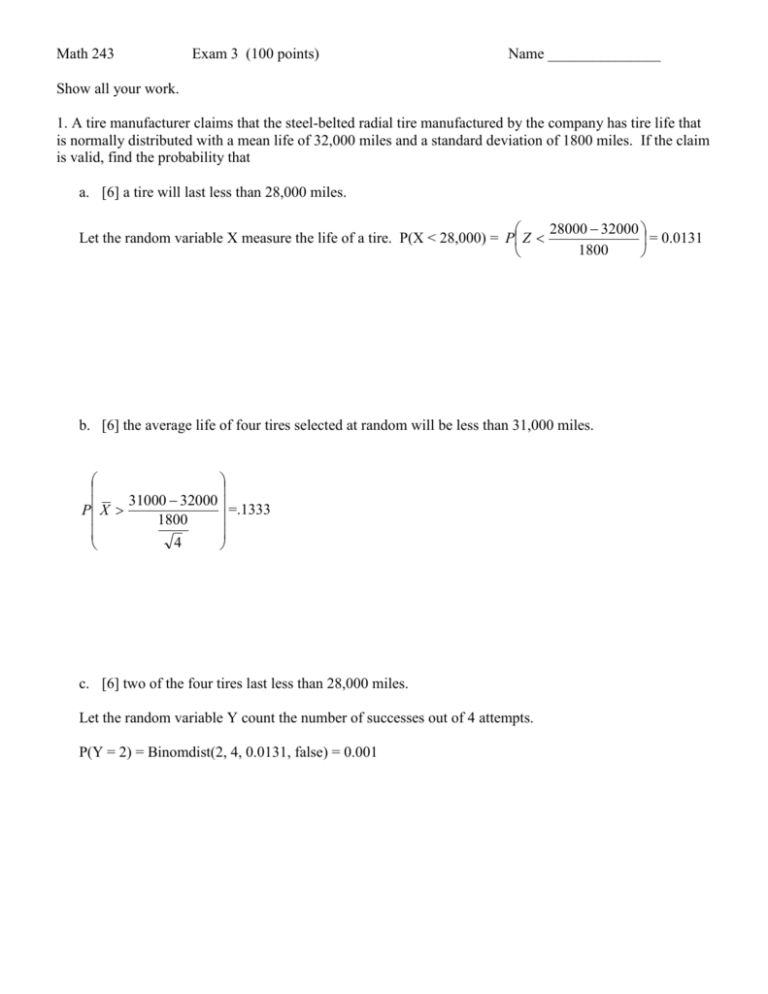
Math 243 Exam 3 (100 points) Name _______________ Show all your work. 1. A tire manufacturer claims that the steel-belted radial tire manufactured by the company has tire life that is normally distributed with a mean life of 32,000 miles and a standard deviation of 1800 miles. If the claim is valid, find the probability that a. [6] a tire will last less than 28,000 miles. 28000 32000 Let the random variable X measure the life of a tire. P(X < 28,000) = P Z = 0.0131 1800 b. [6] the average life of four tires selected at random will be less than 31,000 miles. 31000 32000 =.1333 P X 1800 4 c. [6] two of the four tires last less than 28,000 miles. Let the random variable Y count the number of successes out of 4 attempts. P(Y = 2) = Binomdist(2, 4, 0.0131, false) = 0.001 2. [6] You toss a fair die 8 times. What is the probability that you roll an even number 3 out of the 8 times? Let the random variable X count the number of times a dice number is even. The probability of success is p = ½, and n = 8. P(X = 3) = Binomdist(3, 8, 0.5, false) = 0.21875. 3. [6] A drug company is debating whether a vaccine is effective enough to be marketed. The company claims that the vaccine is 90 percent effective. To test the company claim, the vaccine will be tried on 100 people. If 82 or more people develop immunity, the company claim will be granted. Find the approximate probability that the company claim will not be granted when in fact the drug is 90 percent effective, as the company claims. Let the random variable X count the number of people who develop immunity. P(X ≤81) = binomdist(81, 100, 0.9, true) = 0.0458. Using a normal approximation. 81 0.9(100) =0.00135 P Z 100(0.9)(0.1) With continuity correction. 81.5 0.9(100) P Z =0.00230 100 ( 0 . 9 )( 0 . 1 ) 4. Let the binomial random variable X count the number of successes. Let the number of observations equal 300. The probability of success is 0.40. a. [6] What is the expected number of successes we should observe from the 300 trials? .4(300) = 120 b. [6] Calculate P(X ≥ 135) by using a normal approximation with continuity correction. 134.5 120 P(X ≥ 135) = P Z = 0.0437 300 ( 0 . 4 )( 0 . 6 ) 5. [6] A person is paid under a bizarre scheme in which the person’s weekly salary is determined by chance as indicated by the table below. The random variable Y determines the possible salaries the person earns in one week. So this person has a 40% chance of earning $950 for any given week. Y P(Y) $950 0.4 $750 0.5 $600 0.1 Suppose we look at this person’s mean weekly salary for 80 weeks. What is the approximate probability that the mean salary for the 80 weeks will be more than $850 per week? .4(950 815) 2 .5(750 815) 2 .1(600 815) 2 118.43 μ = 950(0.4) + 750(0.5) + 600 (0.1) = 815 850 815 =.0041 PY 850 = P Z 118.43 80 6. [6] Suppose that the breaking strength of cables (in pounds) is known to have a normal distribution with a standard deviation σ equal to 6 pounds. Find how large a sample must be taken so as to be 90 percent confident that the sample mean breaking strength will not differ from the true mean breaking strength by more than 0.75 pounds (margin of error). 2 1.645(6) n= 174 0.75 7. A chemist has to estimate the true mean amount of an active ingredient in a pill. When a random sample of 20 pills was analyzed for an active ingredient, the mean active ingredient was 0.520mg. Suppose it is reasonable to assume that the amount of active ingredient in a pill is normally distributed with σ = 0.040mg. a. [6] Create a 99% confidence interval. 0.52 2.576 0.040 20 ( 0.497 , 0.5430) 8. [5] A researcher attempting to estimate the mean of some population by gathering a simple random sample and creating a 95% confidence interval. Explain what the 95% confidence is referring to? The procedure used to create the confidence interval will capture the population mean 95% of the time in the long run. 9. [5] A 94% confidence interval for μ is (13.8, 16.2). Would a 97% confidence interval with the same data be wider or narrower? Wider. 10. [5] A television station is interested in predicting whether voters are in favor of an increase in the state sales tax. It asks its viewers to phone in and indicate whether they support or are opposed to an increase in the sales tax in order to generate additional revenue for education. Of the 2633 viewers who phoned in 1474 (55.98%) were opposed to the increase. The number 55.98% is a circle one a. a statistic b. a parameter c. a sample 11. [5] We say that the design of a study is biased if a. b. c. d. d. a population. ____C______ racial or sexual prejudice is suspected. random placebos have been used. it systematically favors certain outcomes. the correlation is close to 1 or –1, indicating a lurking variable is present. 12. [5] A double blind experiment consist of a) Giving a placebo to a group of subjects. ____C______ b) blindfolding subjects before receiving a placebo c) hiding from the researchers and the subjects the knowledge of who is receiving a placebo and who is receiving a treatment d) giving a placebo to the researchers and the subjects so that the researchers can better understand the affect of the placebo. 13. [5] Choose a simple random sample of size three from the following employees of a small company. 01 Carrick 02 Heart 03 Maunu 07 Markman 08 Street 04 Stone 09 Patula 05 Sumner 06 Mapston 10 May Use the numerical labels attached to the names above and the following list of random digits, extracted from the random number tables to pick the random sample of three employees. 11793 20495 05907 11384 44982 20751 27498 12009 45287 71753 66419 84533 Note: use the method shown in class on how to gather a random sample from a random number table. Stone, Sumner, and Markman. 14. [5] Suppose that the distribution of a population is not normal. Then the sampling distribution for a large enough sample size a. is the same as the original population b. is exactly normally distributed. c. is approximately normally distributed d. is binomially distributed. 15 [5] Let X be a binomial random variable, with probability of success equal to 0.9. Suppose I am observing 20 trials, and I want to calculate the probability that P(X 18). Could you use a normal approximation to calculate this probability according to what we have learned? Do not actually calculate the probability. You need to provide evidence for your conclusion. Since 20(1 0.9) 10 we should not use a normal approximation.

